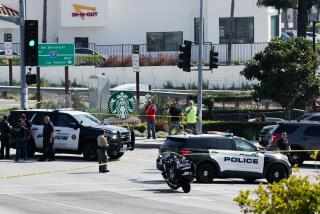A faithful diner’s last will and condiments
Bruce Lindsay knew a good bargain when he saw one: For decades, the millionaire ate three square meals a day in the cafeteria of tiny Vanguard University in Costa Mesa, surrounded by students who called him the “campus grandpa.”
When he passed away last month at 79, the college learned just what a generous tip he had left. He bequeathed his fortune -- amassed by buying up cut-rate oil leases and flipping beachfront homes -- to the Christian university, which like many private colleges across the country has been bedeviled by the slumping economy.
It’s not yet known how far Lindsay’s donation will go toward easing Vanguard’s mounting $42-million debt. The university is still calculating the value of his estate, estimated to be at least several million dollars.
But the beloved penny-pincher never married and had no children, and the university is his sole beneficiary.
Lindsay, who ate his last meal at the cafeteria just days before he died, was a product of the Great Depression. He scrimped and saved wherever he could. Despite his wealth, he lived modestly. He drove a Prius in his later years to save gas money and relished a good cheap meal -- which is what brought him to the student commons on the 70-year-old Vanguard campus.
“It was a great meal at a great price,” a friend recalled him saying.
Over the years, the gray-haired man in the short-sleeved plaid shirt became a legend at the 2,200-student university, where -- over a plate of Swedish meatballs and a large bowl of soft-serve ice cream -- he would hold court in the crowded dining hall. Lindsay befriended students and dispensed Depression-era advice to anyone who would listen: Respect your parents, never drink or smoke, be frugal, save money.
“I didn’t sit with him every day, but there was always a big group of people who would eat with him at breakfast,” recalled sophomore Brandon Arias.
Before Lindsay discovered Vanguard’s food in the 1960s, he was a regular at the cafeteria at Newport Beach’s Hoag Memorial Hospital Presbyterian. That is, until someone alerted him that a cheaper deal could be found up the road at Vanguard: All you can eat for a buck and a quarter.
“ ‘Frugal’ is not the right word for Bruce,” suggested business professor Ed Westbrook, who befriended Lindsay. “He was real miserly.”
In the mornings, Lindsay would pull on a wool beanie, stop by a bank to snag a free cup of coffee and then head to Vanguard for breakfast in the cafeteria, usually an omelet topped with avocado. Between meals he would walk to the campus library to read free newspapers or wander through the administration building to chat with school officials. He would often grab an extra piece of fruit at lunch to hold him over until dinner.
Afternoons were sometimes spent meeting with students in the library. A former university president gave Lindsay the title of “student advocate” in the 1980s because students went to him with their problems and he in turn went to campus officials to help solve them.
With the title came free cafeteria food, and Lindsay rarely missed a meal from then on. Vanguard’s close-knit community became Lindsay’s family. Students and professors took turns driving Lindsay to the dentist or doctor -- when they could persuade him to shell out the money for such visits. He suffered from diabetes, a bad heart and cancer of the skin and prostate.
“We tried to get him to take better care of himself,” Westbook said. “But he didn’t want to pay for it.”
Westbrook frequently invited Lindsay to be a guest speaker for his Introduction to Business class.
“He was a good illustration of a man who was frugal and able to live on very little,” Westbrook said. “It was a counterbalance to people who thought you needed to make a lot of money to live well in life.”
Lindsay would tell students how he made his nest egg hunting for cheap oil and mineral leases and bargain properties. He owned more than 1,000 oil leases, many of them snapped up in the 1960s when oil cost $2.25 a barrel, said Mary Young, a Vanguard alumna who wrote “Bruce,” a 63-page biography of Lindsay that is distributed on campus.
He recalled growing up in Omaha, poor and often hungry. One day, walking home from school, he found a nearly empty peanut butter jar in a neighbor’s trash can -- a tasty discovery and something of a defining moment for Lindsay. He repeated the story often.
Though Lindsay lived on the cheap, he wasn’t afraid to pass judgment on the cafeteria fare. Lindsay’s last words to Westbrook: “The cook put too much salt in the soup.”
His soft spot was the ice cream. Instead of using the small cups the cafeteria provided, Lindsay would grab a large cereal bowl and load it to the brim with ribbons of vanilla and chocolate.
As Lindsay’s estate is sorted out, one caveat is known. A portion of the money must be used to help build a new dining hall.
“That way,” Westbrook said, “students will always be eating with Bruce.”
--
More to Read
Start your day right
Sign up for Essential California for news, features and recommendations from the L.A. Times and beyond in your inbox six days a week.
You may occasionally receive promotional content from the Los Angeles Times.






